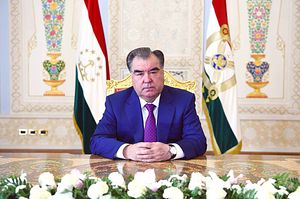The already strained Iran-Tajikistan relationship further deteriorated this week when Tajik state television aired a documentary accusing Tehran of stoking the 1992-1997 Tajik Civil War by providing funds to the Islamist opposition and training militants. The program reportedly featured three Tajiks confessing to a string of assassinations in the mid to late 1990s. The three, according to Reuters, were depicted in handcuffs saying they were funded and trained in Iran.
As Farangis Najibullah wrote for RFE/RL, the documentary is just the latest in “a series of inauspicious moves that threaten to erode ties between two countries whose political and diplomatic relations have rarely matched their cultural and linguistic bonds.”
The Tajik language, notably, is not Turkic like other regional tongues but instead a Persian dialect. The shared cultural heritage between Iran and Tajikistan is often trotted out as the foundation of good relations; but as this incident demonstrates, modern politics can most certainly trump historical roots.
Iran’s pleasant reception of the Islamic Renaissance Party’s exiled leader, Muhiddin Kabiri, at an Islamic conference in Tehran mere months after Dushanbe branded the IRPT an extremist organization in 2015 marked the downturn in relations. Kabiri was pictured shaking hands with Iranian Supreme leader Ayatollah Ali Khamenei and seated next to the official Tajik delegation. Najibullah explains a host of other steps in the downward trajectory of the Iran-Tajikistan bilateral, from commercial disputes to subsequent diplomat snubs.
While Reuters commented that the televised confessions “mark the first time Iran has been publicly accused of involvement in Tajikistan’s 1992-97 civil war,” RFE/RL’s formulation is a touch more nuanced: “[The documentary] represents the first time Dushanbe has openly accused Iran of financing and directing political killings following the civil war.”
Iran was certainly involved in Tajikistan’s civil war: it hosted three peace conferences in 1994, 1995, and 1997. Iran remained neutral in the conflict itself; but such an accusation — that Tehran was involved — has existed as rumor since the string of killings toward the end of the civil war and after. Indeed, even before the war, Soviet-era media accused Iran (as well as a host of others) of possible involvement in the country.
As Kirill Nourzhanov and Christian Bleuer note in their history of Tajikistan, the IRPT was founded in 1990, an offshoot of a Soviet Union-wide organization. The Tajik Communist Party tried to outlaw and suppress the movement:
Even before this series of events, a media campaign was launched to portray Tajik Islamists as terrorists trained in Afghanistan and Pakistan, or, alternatively, in Saudi Arabia and Iran with CIA money, who desired to ‘found an exclusively Islamic society through physical elimination of ideological opponents and non-believers, and general genocide’. The IRP was even accused of organizing the riots in Dushanbe in February 1990 on behalf of ‘the Wahhabis and other fundamentalist Islamic forces from abroad’.
The Iranian embassy in Dushanbe predictably pushed back against the new documentary, saying in a statement that “The airing of such biased films… shows that certain circles do not want to see… stronger friendship between the two countries.”
Those “certain circles” are likely a reference to Iran’s regional nemesis, Saudi Arabia. As EurasiaNet noted in early July, as Tajikistan has made steps back from its relationship with Iran, it has made steps forward toward Saudi Arabia.
The validity of Tajikistan’s accusation can’t be vetted via televised, and likely forced, confessions; but that’s not really the point. The documentary will most certainly bolster already-held assumptions about Iran and further stoke pre-existing rumors about the IRPT’s external connections.

































